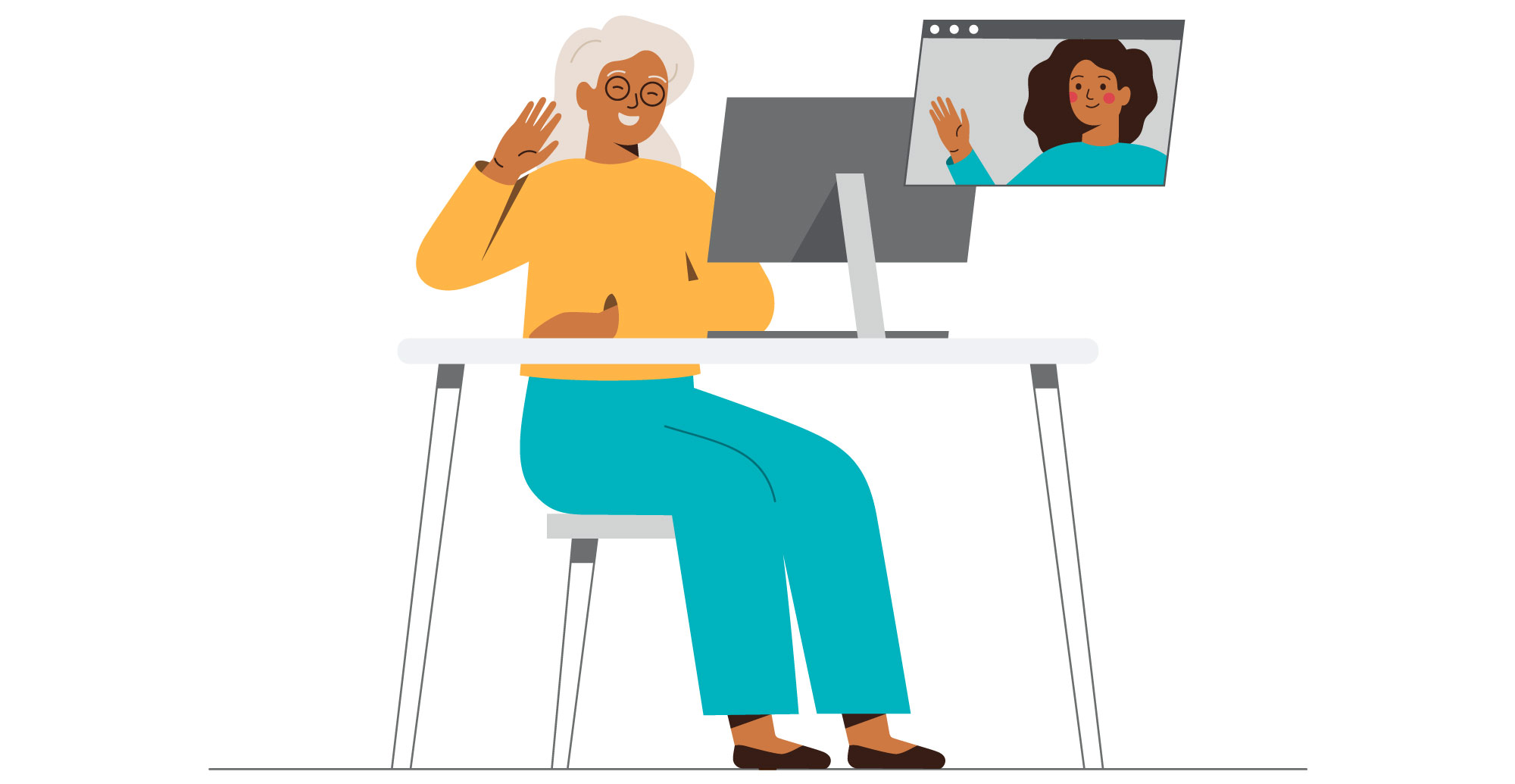At the beginning of the pandemic, we were all charting unfamiliar territory. Although CCC’s ability to serve clients was undisrupted when we pivoted immediately to online counselling services, we were unsure if online counselling would be as effective as in-person care as at the time there were not sufficient research data on the topic. As an organization grounded in research and measurable results, we were pleased to see that as we worked with clients throughout the pandemic, their results were equally as high as in-person counselling.
The ongoing distress brought on by the many aspects of the pandemic resulted in a significant increase in requests for counselling for individuals, couples, and families alike. We were able to meet this demand while safeguarding the well-being of our own workforce and maintaining our quality of care.

All counselling services — one-on-one and group counselling programs — continued to be delivered online. We applied our learnings from 2020, improved our processes, and further enhanced our services to make sure that our clients received outstanding results. Collaboration is key to our work, and we continue to develop relationships with local and provincial partners.
The key to our quality of care and unparalleled client outcomes is our Feedback Informed Treatment (FIT) approach. FIT is a tool developed to measure the mental health vital signs of clients at every counselling session. Clients complete questionnaires, which provides us the information needed to assess their progress and adjust the therapy course as needed. This ensures the client benefits from counselling and achieves the highest results possible.
The development of the FITAPP, created a more effective, streamlined process for our clients to access our FIT tools online. The Outcome Questionnaire, a 45-question tool to measure client’s level of distress prior to each session, is automatically sent to the client’s counsellor upon completion. The Session Rating Scale, a tool we utilize to assess the client-counsellor relationship, which is significant for optimum results, is now also completely digital through the FITAPP.
We continued to provide ongoing training to our counsellors in 2021, enhancing their skills through: monthly clinical consultations with Dr. Michael Yapko, a leading expert in treating depression experientially; and monthly clinical consultations continued for all counsellors with Dr. Scott Miller, an expert in increasing beneficial client outcomes in therapy. These consultations continuously enhance the application of Feedback Informed Treatment leading to improved client results.
Specialty Areas
Wilson Centre for Domestic Abuse Studies
CCC continues to lead in the area of domestic abuse treatment and prevention. We provide counselling and group programs for all genders, and to both those that are abusive in intimate relationships and to those that experience abuse. In addition to these services, we also collaborate with and guide other professionals on domestic abuse counselling best practices.
The Wilson Centre for Domestic Abuse Studies at Calgary Counselling Centre is a vital resource for those in our community who are affected by domestic abuse. We partner with researchers from universities across North America to learn how we can better support our clients who are impacted by domestic abuse.
In 2021, we continued to collaborate, locally and provincially on treatment standards for domestic violence and refined our community work with individuals who experience intimate partner violence. Through these collaborations, we are working on developing a robust primary prevention framework: a system of addressing the issues that lead to domestic violence before they start.
We also adapted our online counselling and programs to better serve demographics with accessibility or technological challenges.
We completed our work on the Provincial Mental Health Diversion Program pilot project, a program that aims to divert people charged with a minor criminal offence who may have a mental health concern, from the criminal justice system to appropriate social supports, mental health, and addiction treatment in the community.
This year, we began planning the expansion of our services for men, with a focus on how to engage men and boys in forming healthy relationships and learning skills to manage difficult emotions.
The Male Domestic Abuse Outreach Program (MDAOP) continued to offer virtual outreach and counselling services. With the provincial implementation of Clare’s Law, the MDAOP has seen a small influx of new referrals. In November, the MDAOP coordinator presented at two online conferences: The annual Bridging Communities conference, hosted and organized by the Calgary Domestic Violence Collective, and the Diverse Voices Family Violence conference, the largest annual family violence conference in Western Canada. At these events, we shared a snapshot of what CCC has learned about male victims seeking support, based on outcome data collected between 2017 to 2020.
Depression & Anxiety
Depression and anxiety have consistently been among the top reasons that people seek counselling at Calgary Counselling Centre. Although different, they present similar symptoms and can often occur at the same time. In 2021, over 3,300 of our clients (30.7%) requested counselling for depression or anxiety.
Depression is complex and each person struggling with depression impacts at least three other people. CCC strategically works to engage family members in the counselling process. To break the cycle of depression and protect families we provide counselling for the person experiencing depression and we give each family member problem-solving, decision making and discernment skills to help them achieve a better quality of life for themselves and their families. Depression is prevalent but also one of the most treatable mental health issues, and the sooner people seek help, the more rapid the recovery process.

CCC clients that go through our depression counselling services continue to experience outstanding results. The combined approach of individual counselling in addition to group counselling is the approach with the most effective outcomes. Our research shows that clients that participate in our group counselling programs after individual counselling, experience more meaningful results than those who participated in individual counselling alone. On average, clients report almost double the decrease in their levels of distress after completing a group program compared to clients who just completed individual counselling. Group counselling helps reinforce what is learned in individual counselling and gives the support and perspective of others in a similar situation. Our new group program, Take Charge of Your Life has helped clients create a better quality of life by becoming a part of a group focused on learning new skills, developing new perspectives, and resolving challenges. Consultations with Dr. Michael Yapko assisted counsellors to build clinical competencies to assist clients in the most effective and efficient manner, to develop resources and skill sets, and to connect to a more positive future.
Children & Youth
In 2021, we provided counselling to 3,267 children, youth, and emerging adults between the ages of 3 and 24.
| Age range | % of young clients |
|---|---|
| 3–12 | 15% |
| 13–17 | 17% |
| 18–24 | 68% |
The pandemic continued to impact children, youth, and their families in 2021. Children and youth faced another year where their schooling may have gone back and forth between in-person or online. Public health measures were continually in flux, restricting social interaction and increasing anxiety.
CCC responded to the increase in demand for services for young people and adapted counselling methods to effectively deliver therapy online. Counsellors were flexible and creative in developing innovative methods and techniques to engage younger clients in counselling. Through the use of visuals, and incorporating what children had around them, such as toys, puppets, artwork etc. our counsellors we able to keep children and youth engaged in the counselling process.

Online group counselling programs were offered to children, youth, and their families. Parents attended groups with other parents, and children and youth attend groups with others in their same age group. They tackled contemporary issues related to families working through divorce, families wanting to learn how to better connect and strengthen their relationships with each other and how to manage turmoil or conflict.
Calgary Counselling Centre runs the Brief Intervention Caregiver Support Program (BICS), which provides support in the home for caregivers of children in kinship and foster care who are experiencing transition or caregiving-related placement challenges. The BICS program was designed to mitigate the effects of trauma, address factors that contribute to placement disruption, and enhance caregivers’ capacity to provide nurturing, stable environments for children in care. In 2021, the BICS program was accredited through the Canadian Accreditation Council of Human Services, ensuring that the program meets the best standards of practice.
Education & Training
Learn about the largest non-university training facility of its kind in Western Canada.
Community
In a year of unpredictability, we knew we needed to be a solid support and resource for our community.
Research
Research findings generated from CCC have led to an unparalleled improvement in outcomes for clients.
